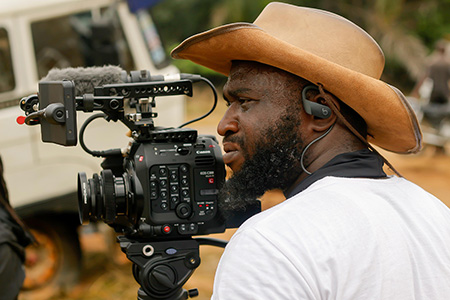The following is part of our ongoing series of profiles covering the work of journalists who have received grants from the OPC.
Simpa Sampson, a freelance videographer who was part of the Bloomberg team that received a Citation for Excellence in the Morton Frank category this year, did not set out to specialize in covering conflict, but career and opportunity nudged him in that direction.
“I had no idea what it takes to film in a war zone area,” he said. “It was never my professional focus. I was just a film enthusiast that just wanted to create a body of work.”
Sampson started as a freelancer in 2012 covering video news features for outlets such as Voice of America, Turkish Radio and Television (TRT) World, and the Russian service Ruptly. But he soon grew wary of the limitations of three-minute news packages. Sampson was looking for a change in 2017 when TRT World asked him to help film two documentaries in northeast Nigeria, in the embattled Borno state near Lake Chad, to fill in for a cameraman whose visa to the country had been denied.
“The TRT reporter was looking for a cameraman who can shoot and edit in the TRT style. My name came up, and the rest was history.”
Sampson applied for and received an OPC COVID-19 micro-grant of $1,000 in March 2021. He was among the 92 OPC grant recipients funded by the Ford Foundation in that round of assistance. Assignments had dried up, pending projects put on hold, producers stopped answering his emails, and “everything just went blank,” Sampson said.
“The OPC grant came at the right time,” he said. “I was so surprised because I never thought I would be selected. It was able to help me take care of my family because I had two dependents then. It was such a relief and a bright light in the tunnel of the chaotic loss of jobs that came with the pandemic and lockdown.”
Sampson recalled taking some risks during his first war assignments. “I can say that I was reckless,” he said. “And I think in a way it helped me, because I was never thinking about the risk in filming in the northeast. I was more concerned about filming stories that would make an impact, and how I could also use it as a job reference for other jobs to come. I didn’t own a flak jacket then, although the reporter came along with one for me.”
Sampson has since become more cautious. “I am more experienced now. I have my own flak jacket, and have taken some HEFAT courses,” he said, referring to the common acronym for Hostile Environment and First Aid Training. “Before any project or media gathering, there are lots of security briefings, clearance, and open channels of communication with the security team in whichever location that I am filming.” Now, Sampson added, if he doesn’t like the security picture for the assignment, he won’t deploy. “The turn of events in a war zone can happen in a split second, so I personally make sure the organization hiring me does every due diligence before any deployment.”
His work last year on the OPC citation-winning documentary “Black Snow” was his first assignment for Bloomberg. Sampson said he received a message on LinkedIn from the producer, Matt Goldman, who wanted to cover the devastating health impacts of the black market oil economy in the Niger Delta. He took the job, keen to demonstrate his video skills and ability to report on difficult stories.
He said filming was often emotionally draining, as they documented catastrophic pollution from airborne soot. Sampson remembered taking a woman suffering health effects to a hospital, who asked him for money to pay help pay for care. “It broke my heart hearing that, and I couldn’t give her a positive answer, I just referred her to the fixer,” he said. Two day later, while he was filming other scenes for the piece, they received news that she had died. “It was a sad shooting day after that news.”
Sampson said his documentary style in that project was to get as close as possible to the characters, “so that whoever is watching will be able to feel what the people of the Niger Delta are feeling.” He added that he strives to depict each source with dignity, “because they are human, and what has befallen them could have happened to anyone.”
Sampson said he hopes one day to secure an assignment as an embedded videographer with the military, and also wants to travel around Africa to tell stories on the effects of climate change, among other topics. “I have a lot of climate change stories that need to be told and I am really hoping I get to collaborate with any network that will be ready to collaborate to tell Africa stories.”

